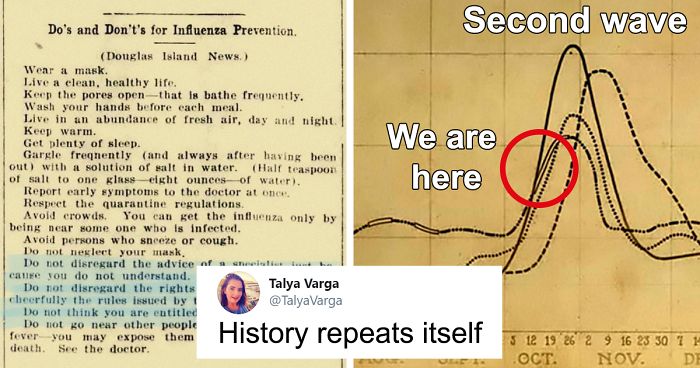
People Are Sharing “Do’s And Don’t’s” From 1918-1920 During The Spanish Flu, It Shows How History Repeats Itself
History tends to repeat itself, and even though COVID-19 is not the worst flu whatsoever, we as a society seem to be making the same mistakes we did in 1918 during the Spanish Flu outbreak.
Talya Varga turned to Twitter to share an old newspaper article allegedly showing a list of “do’s and don’t’s” for preventing the Spanish Flu. Sadly, almost all of the entries look painfully familiar.
“Wear a mask,” reads the first. “Wash your hands before each meal”, says another. Not to mention the one that urges to “not disregard the advice of a specialist just because you do not understand.”
After Varga highlighted the issue, her tweet immediately went viral, sparking an important discussion.
Image credits: TalyaVarga
Image credits: TalyaVarga
The 1918 influenza pandemic is one of the most severe pandemics in recent history.
It was caused by an H1N1 virus with genes of avian origin. Although there is no universal consensus regarding where the virus came from, it spread worldwide from 1918-1919.
In the US, it was first identified in military personnel in spring 1918.
Some estimates suggest that as many as 500 million people or one-third of the world’s population became infected with this virus. The number of deaths was considered to be at least 50 million worldwide with about 675,000 occurring in the United States.
As the tweet started to go viral, more and more people began responding to it
Image credits: Noname06401912
Social distancing saved thousands of American lives during the Spanish flu outbreak. Philadelphia, for example, detected its first case of a deadly, fast-spreading strain of influenza on September 17, 1918. The very next day, in an attempt to halt the virus’ spread, city officials launched a campaign against coughing, spitting, and sneezing in public. Good start. 10 days later, however, despite the potential epidemic, the city hosted a parade that 200,000 people attended.
Flu cases continued to climb until finally, on October 3, schools, churches, theaters, and public gathering spaces were closed.
Two weeks after the first reported case, there were at least 20,000 of them.
For comparison, when a case popped up in St. Louis, the city shut down most public gatherings and quarantined victims in their homes just two days later.
By the end of the pandemic, the death rate in St. Louis was less than half of the rate in Philadelphia.
About 358 people per 100,000 died in St Louis, while there were about 748 deaths per 100,000 people in Philadelphia.
It’s pretty saddening to see that while technology and medicine have made huge leaps since the beginning of the 20th century, our mindsets have somewhat remained the same, and we can’t come together to fight this microscopic yet very powerful enemy.
Image credits: omicRocker
Image credits: ChrisDo30828241
Image credits: BlackMamaku
Image credits: PhotoDM
Image credits: paulforrester8
Image credits: SPQR_2704
Image credits: BlackPrinz
Image credits: RockwallBlue
Image credits: Nikki_hartley86
Image credits: mpjonesinfo
Image credits: StevenGeorgant1
Image credits: banreportcards
Image credits: voinageo
Image credits: boerlaur
Image credits: RobinJFMcBurnie
Image credits: kcsteele59
Image credits: IngoHeuschkel
Image credits: Andybravery2
Image credits: Catheri76130871
Image credits: GlynisSpencer
Image credits: alrightage
The mask thing was a huge issue back then too on people keeping them on. If I remember correctly they started doing adverts trying to build on people's national pride to get them to wear masks. China and a lot of Asia kept up the practice of mask wearing and have been doing so for the last 100 years since the Spanish Flu. Oh, fun fact, I have yet to find mask related breathing deaths from the last 100 year history in Asia. I'm still doing research on it, but nada so far, in fact since I've been wearing my mask I've started understanding part of the 'Allergy' reason why they're so popular, it's helped with my allergies, a lot more than I thought it would.
People back then were for the most part hard working people with minimum education so for me there is a degree of excuse in their actions. People today are mostly educated with abundance of knowledge on their fingertips, yet they *choose* to ignore it, along with lessons we should have learned from previous experiences. They dismiss scientific research for no apparent reason, and if some ignorant c*nt posts something of Facebook, then they immediately accept it as a universal truth and won't hear anything against it. I just don't know anymore...
plus, information is a lot more accessible, due to the modern-day media, and the increased literacy of people. The only 'excuse' that people really have for not following the instructions of medical experts within non-3rd-world countries, is laziness, stupidity, or horrendous governments making stupid choices on behalf of its citizens (because if the governments had their act together, they would be able to ensure that those without the funds, could still get access to the bare minimum eg one mask per person, per (time frame) )
Load More Replies...The comment "uh lots of fresh air what about the current lockdown then" cracks me up. Dont you have windows at home? Lol
In the city the air is hardly fresh with all the polution. So, for many people lockdown means no fresh air.
Load More Replies...The breakdown of "community" has led to the scofflaws and face spitters we have now.
"Life, liberty, and the pursuit of happiness" is equated by some as endorsing solipsism and a disregard for others. "Don't inconvenience me for the sake of saving lives". No one's asking them to risk their own lives (it's a mask, not a burning building!), but they'll willingly risk someone else's for the sake of "freedom".
Load More Replies...Search YouTube for “Arizona man carried by son Sprouts masks” A flipping idiot went off on people wearing masks - in a Sprouts in AZ - telling them it was a hoax, that they looked like idiots - looked like they had auntie’s doilies on their faces... the guy’s son literally carried him out out of the store, like a toddler. Thanks Fox!
Sadly, this kind of behavior has become fairly common in Arizona. It's happened to me a couple of times. Most recently was about a week ago, coincidentally, at Sprouts. The look on the guy's face when I told him I had been hospitalized with COVID and asked him if he'd like it too was priceless. Obviously, I'm no longer contagious but he deserved being messed with.
Load More Replies...Just for the record, Spanish flu came from Kansas and shold be named "American flu".
This is what happens if you allow people to leave secondary schooling without a functional understanding (NOT memorisation) of the sciences. Until scientific literacy is mandated for all humans, this will keep happening.
The mask thing was a huge issue back then too on people keeping them on. If I remember correctly they started doing adverts trying to build on people's national pride to get them to wear masks. China and a lot of Asia kept up the practice of mask wearing and have been doing so for the last 100 years since the Spanish Flu. Oh, fun fact, I have yet to find mask related breathing deaths from the last 100 year history in Asia. I'm still doing research on it, but nada so far, in fact since I've been wearing my mask I've started understanding part of the 'Allergy' reason why they're so popular, it's helped with my allergies, a lot more than I thought it would.
People back then were for the most part hard working people with minimum education so for me there is a degree of excuse in their actions. People today are mostly educated with abundance of knowledge on their fingertips, yet they *choose* to ignore it, along with lessons we should have learned from previous experiences. They dismiss scientific research for no apparent reason, and if some ignorant c*nt posts something of Facebook, then they immediately accept it as a universal truth and won't hear anything against it. I just don't know anymore...
plus, information is a lot more accessible, due to the modern-day media, and the increased literacy of people. The only 'excuse' that people really have for not following the instructions of medical experts within non-3rd-world countries, is laziness, stupidity, or horrendous governments making stupid choices on behalf of its citizens (because if the governments had their act together, they would be able to ensure that those without the funds, could still get access to the bare minimum eg one mask per person, per (time frame) )
Load More Replies...The comment "uh lots of fresh air what about the current lockdown then" cracks me up. Dont you have windows at home? Lol
In the city the air is hardly fresh with all the polution. So, for many people lockdown means no fresh air.
Load More Replies...The breakdown of "community" has led to the scofflaws and face spitters we have now.
"Life, liberty, and the pursuit of happiness" is equated by some as endorsing solipsism and a disregard for others. "Don't inconvenience me for the sake of saving lives". No one's asking them to risk their own lives (it's a mask, not a burning building!), but they'll willingly risk someone else's for the sake of "freedom".
Load More Replies...Search YouTube for “Arizona man carried by son Sprouts masks” A flipping idiot went off on people wearing masks - in a Sprouts in AZ - telling them it was a hoax, that they looked like idiots - looked like they had auntie’s doilies on their faces... the guy’s son literally carried him out out of the store, like a toddler. Thanks Fox!
Sadly, this kind of behavior has become fairly common in Arizona. It's happened to me a couple of times. Most recently was about a week ago, coincidentally, at Sprouts. The look on the guy's face when I told him I had been hospitalized with COVID and asked him if he'd like it too was priceless. Obviously, I'm no longer contagious but he deserved being messed with.
Load More Replies...Just for the record, Spanish flu came from Kansas and shold be named "American flu".
This is what happens if you allow people to leave secondary schooling without a functional understanding (NOT memorisation) of the sciences. Until scientific literacy is mandated for all humans, this will keep happening.

 Dark Mode
Dark Mode 

 No fees, cancel anytime
No fees, cancel anytime 






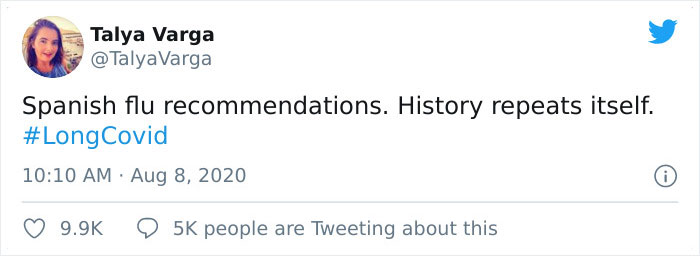
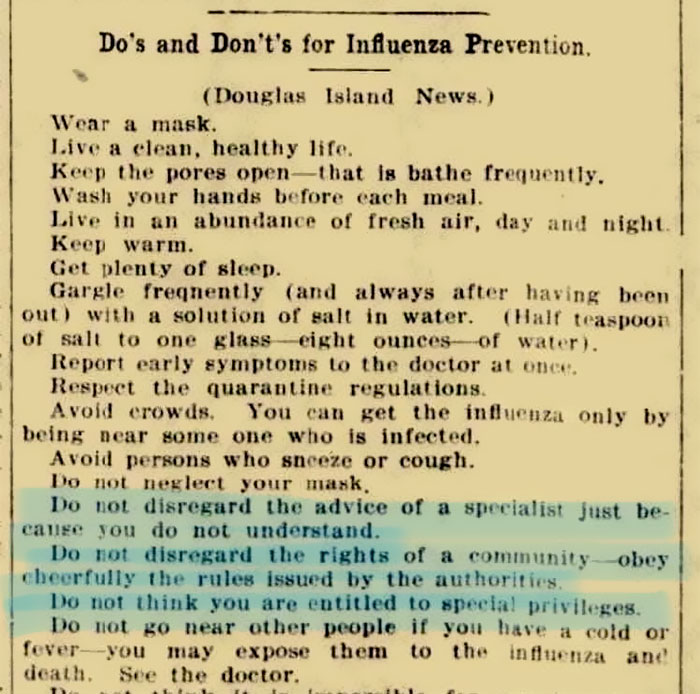
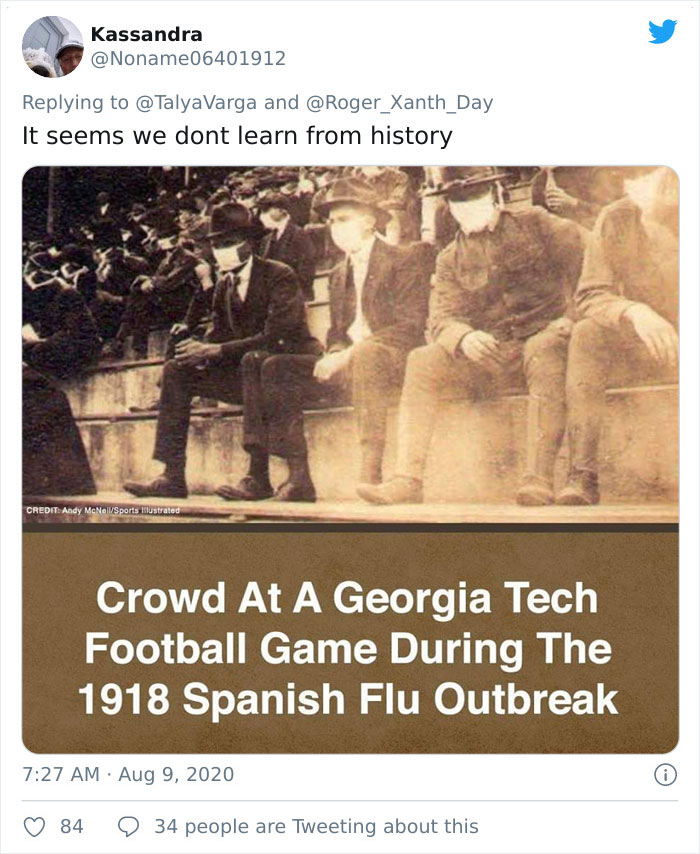
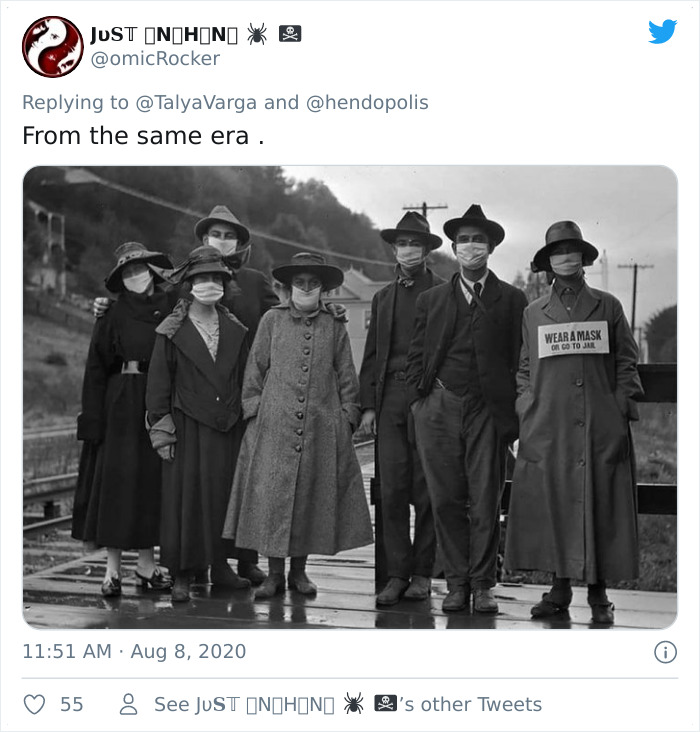
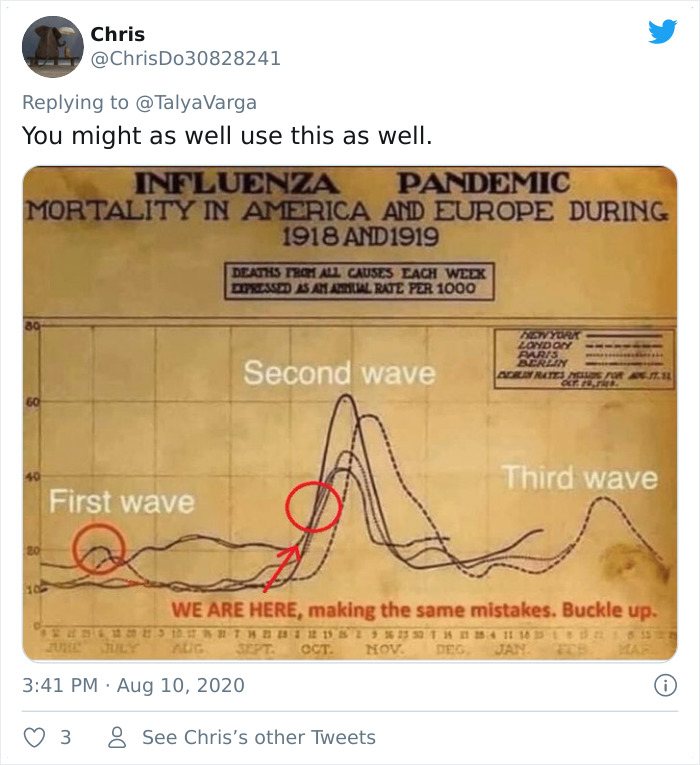

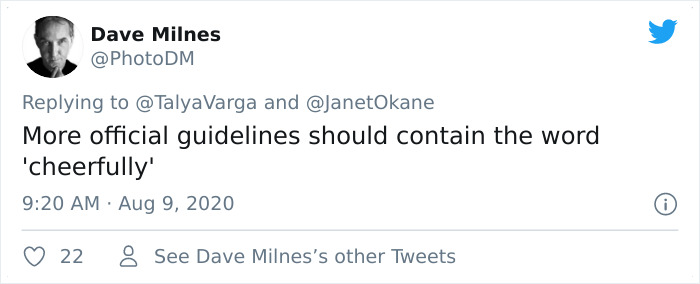
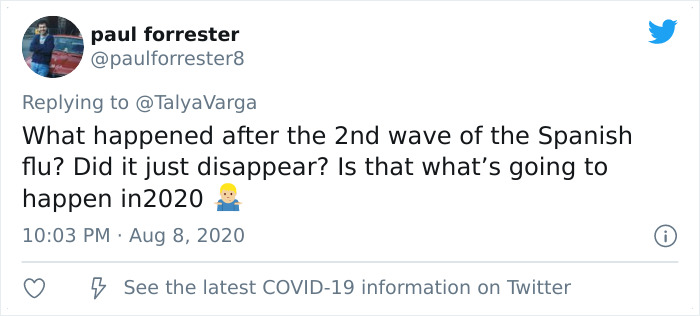
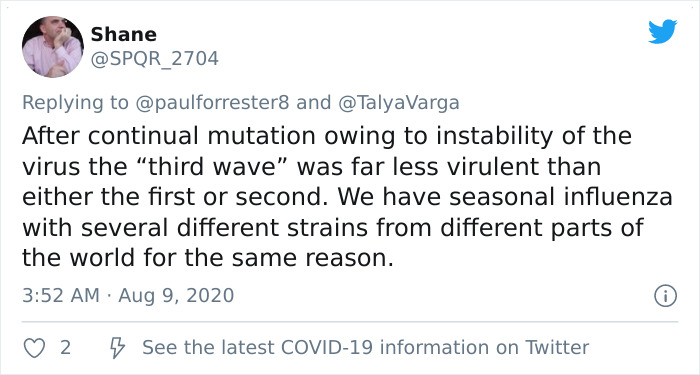
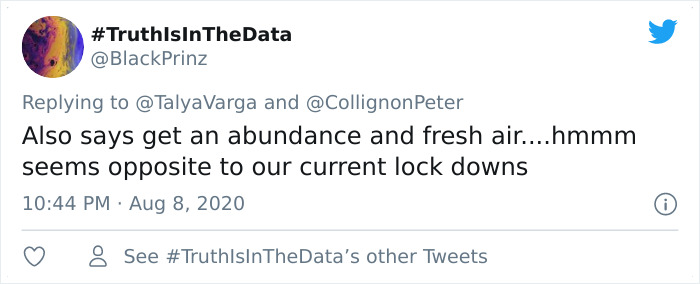
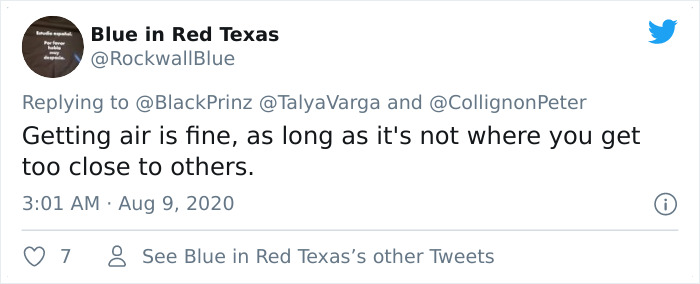
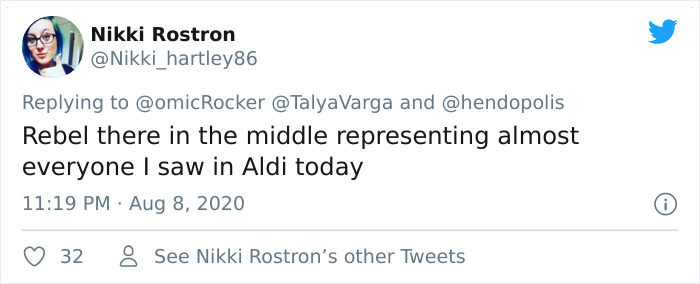
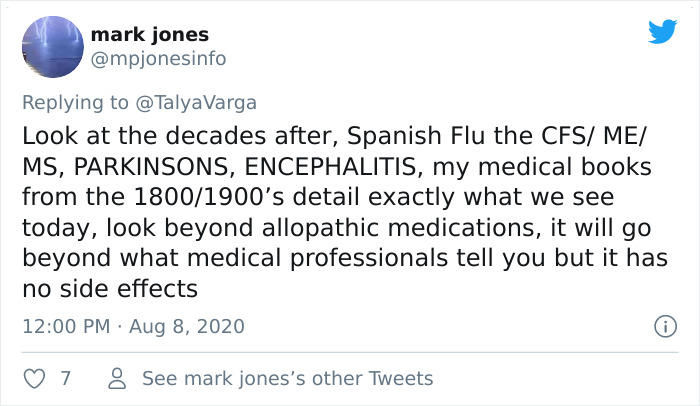
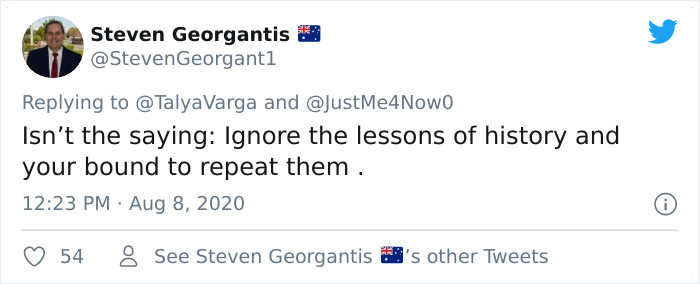
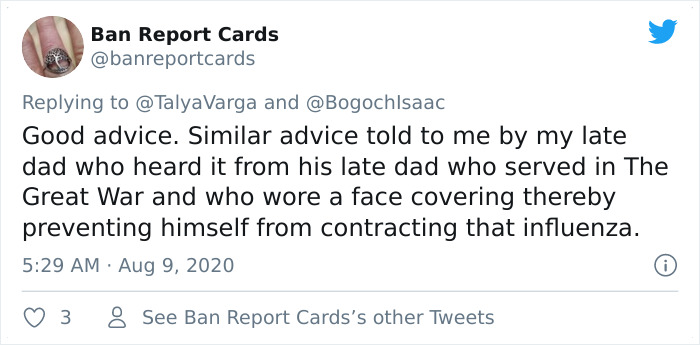
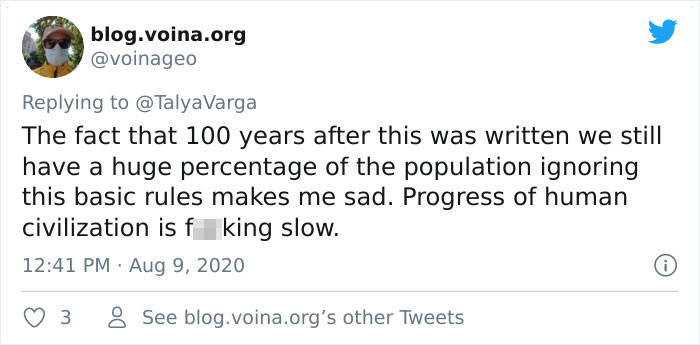
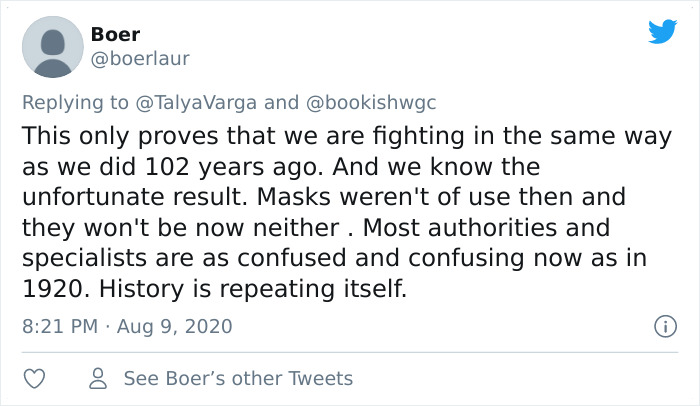
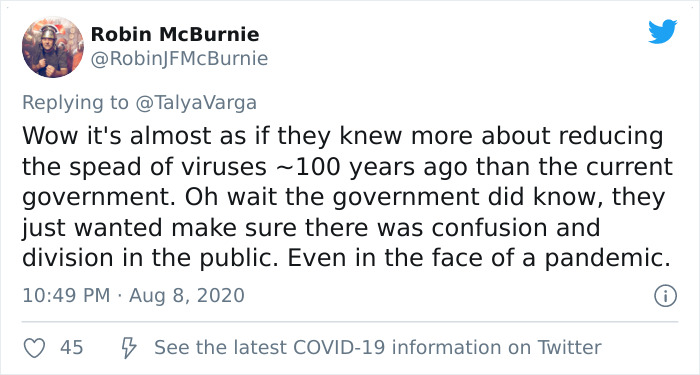




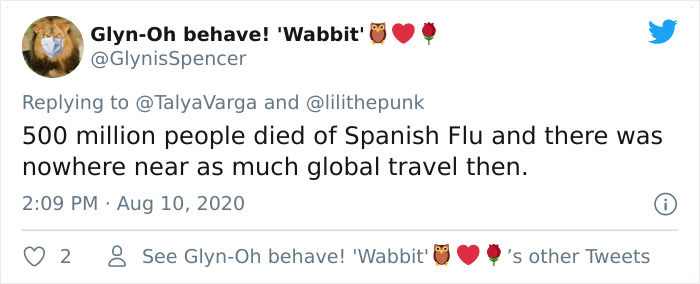
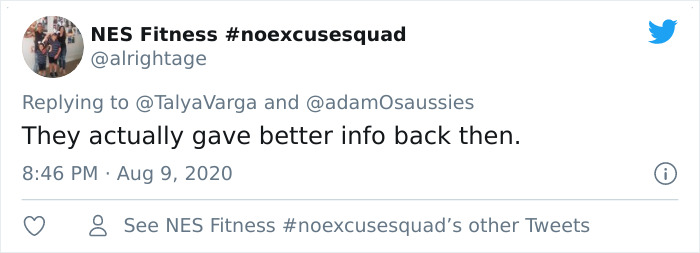











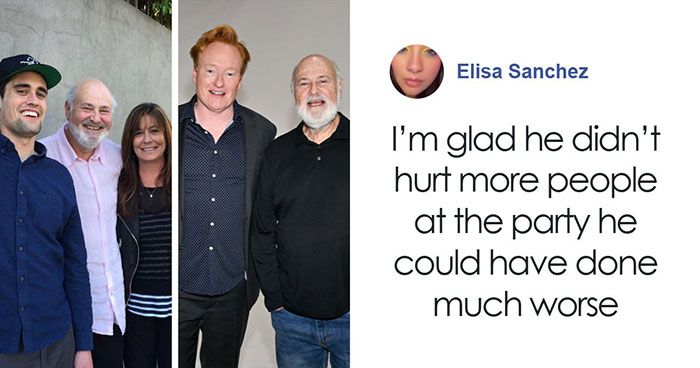

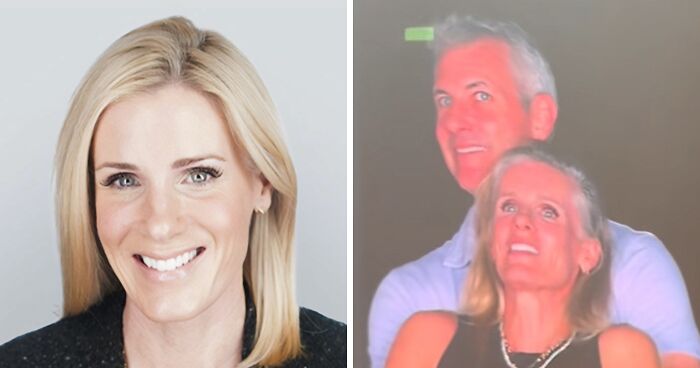































224
51